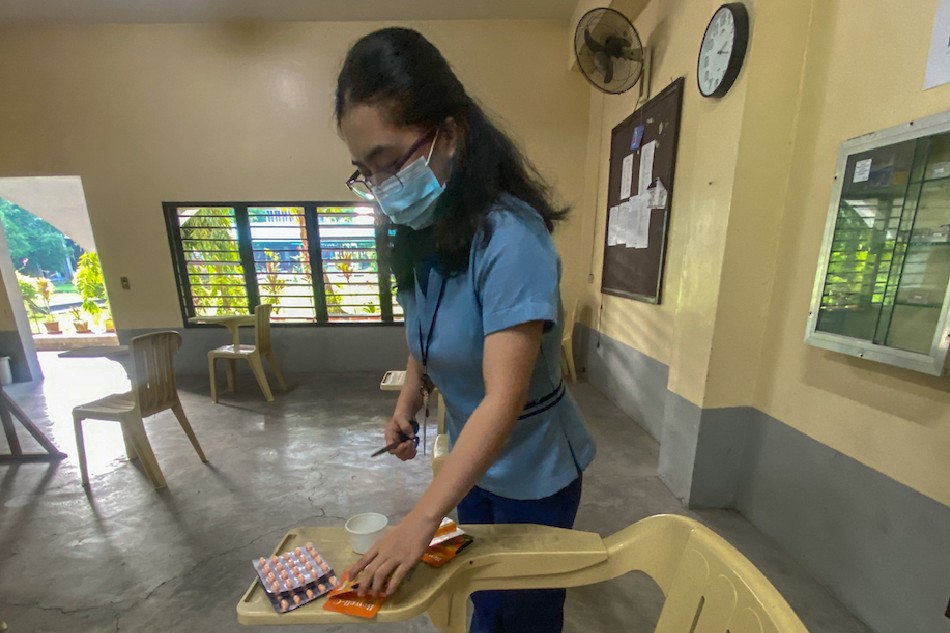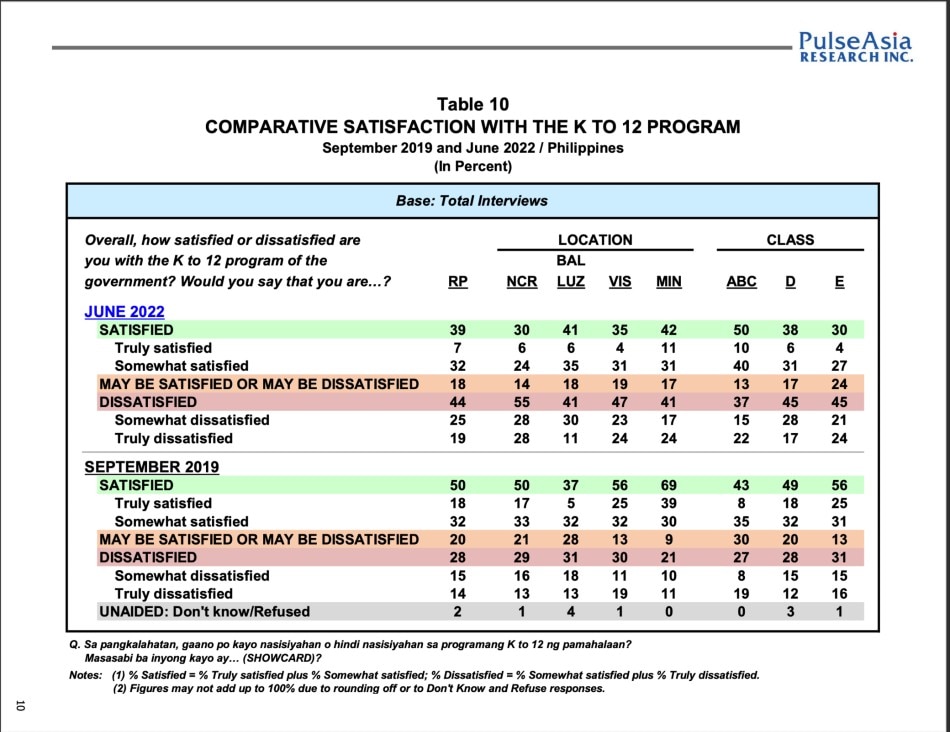Nearly half of Pinoys dissatisfied with K-12 system: survey | ABS-CBN

Welcome, Kapamilya! We use cookies to improve your browsing experience. Continuing to use this site means you agree to our use of cookies. Tell me more!
Nearly half of Pinoys dissatisfied with K-12 system: survey
Nearly half of Pinoys dissatisfied with K-12 system: survey
Jaehwa Bernardo,
ABS-CBN News
Published Jul 18, 2022 01:56 PM PHT
|
Updated Jul 18, 2022 02:52 PM PHT
MANILA — Nearly half of Filipinos are dissatisfied with the K-12 system, results of a commissioned Pulse Asia survey showed Monday, adding to the scrutiny towards the basic education system that was introduced over a decade ago.
MANILA — Nearly half of Filipinos are dissatisfied with the K-12 system, results of a commissioned Pulse Asia survey showed Monday, adding to the scrutiny towards the basic education system that was introduced over a decade ago.
Based on the survey conducted June 24-27, a fourth or 25 percent of 1,200 respondents said they were "somewhat dissatisfied" with the K-12 program while 19 percent were "truly dissatisfied."
Based on the survey conducted June 24-27, a fourth or 25 percent of 1,200 respondents said they were "somewhat dissatisfied" with the K-12 program while 19 percent were "truly dissatisfied."
This means a total of 44 percent were "dissatisfied" with the basic education system, according to the survey commissioned by Senate Basic Education Committee Chairman Sherwin Gatchalian.
This means a total of 44 percent were "dissatisfied" with the basic education system, according to the survey commissioned by Senate Basic Education Committee Chairman Sherwin Gatchalian.
The recent figure is higher than the results of the September 2019 survey, wherein only 28 percent of the respondents were dissatisfied with the K-12 system, Gatchalian said.
The recent figure is higher than the results of the September 2019 survey, wherein only 28 percent of the respondents were dissatisfied with the K-12 system, Gatchalian said.
ADVERTISEMENT
The latest survey also showed that only 7 percent were "truly satisfied" while 32 percent were "somewhat satisfied," meaning a total of 39 percent of respondents were considered "satisfied" with the program.
The latest survey also showed that only 7 percent were "truly satisfied" while 32 percent were "somewhat satisfied," meaning a total of 39 percent of respondents were considered "satisfied" with the program.
Meanwhile, 18 percent could not say if they were satisfied or dissatisfied with the K-12 system, based on the survey.
Meanwhile, 18 percent could not say if they were satisfied or dissatisfied with the K-12 system, based on the survey.
In a statement, Gatchalian said the survey results spelled "the urgency of conducting a review and formulating reforms" on the K-12 program.
In a statement, Gatchalian said the survey results spelled "the urgency of conducting a review and formulating reforms" on the K-12 program.
"Malinaw sa boses ng ating mga kababayan na hindi sila kuntento sa programa ng K to 12. Ito ay dahil hindi natutupad ang mga pangako nito at naging dagdag na pasanin lamang ito sa ating mga magulang at mga mag-aaral," he said.
"Malinaw sa boses ng ating mga kababayan na hindi sila kuntento sa programa ng K to 12. Ito ay dahil hindi natutupad ang mga pangako nito at naging dagdag na pasanin lamang ito sa ating mga magulang at mga mag-aaral," he said.
(It's clear from the voices of the people that they are not contented with the K-12 program. This is because the promises of the program are not being implemented and it instead became an additional burden to our parents and students.)
(It's clear from the voices of the people that they are not contented with the K-12 program. This is because the promises of the program are not being implemented and it instead became an additional burden to our parents and students.)
ADVERTISEMENT
First introduced by the Department of Education in 2011, the K-12 program scrapped the country's previous 10-year basic education system (6 years in grade school and 4 years in high school) after Kindergarten.
First introduced by the Department of Education in 2011, the K-12 program scrapped the country's previous 10-year basic education system (6 years in grade school and 4 years in high school) after Kindergarten.
It mandated Filipino students to complete 6 years in grade school, 4 years in junior high school, and 2 years in senior high school.
It mandated Filipino students to complete 6 years in grade school, 4 years in junior high school, and 2 years in senior high school.
Despite the implementation, Filipino students have yielded poor performances in international learning assessments in recent years.
Despite the implementation, Filipino students have yielded poor performances in international learning assessments in recent years.
Education Secretary Sara Duterte has said President Ferdinand "Bongbong" Marcos Jr. sought for a review of the program.
Education Secretary Sara Duterte has said President Ferdinand "Bongbong" Marcos Jr. sought for a review of the program.
The advocacy group Philippine Business for Education agreed that there is a need to revisit the K-12 system, suggesting to improve the program instead of removing it.
The advocacy group Philippine Business for Education agreed that there is a need to revisit the K-12 system, suggesting to improve the program instead of removing it.
RELATED VIDEO
Read More:
education
basic education
K-12
K-12 review
Pulse Asia
survey
Sherwin Gatchalian
commissioned survey
K to 12
K 12
ADVERTISEMENT
ADVERTISEMENT



